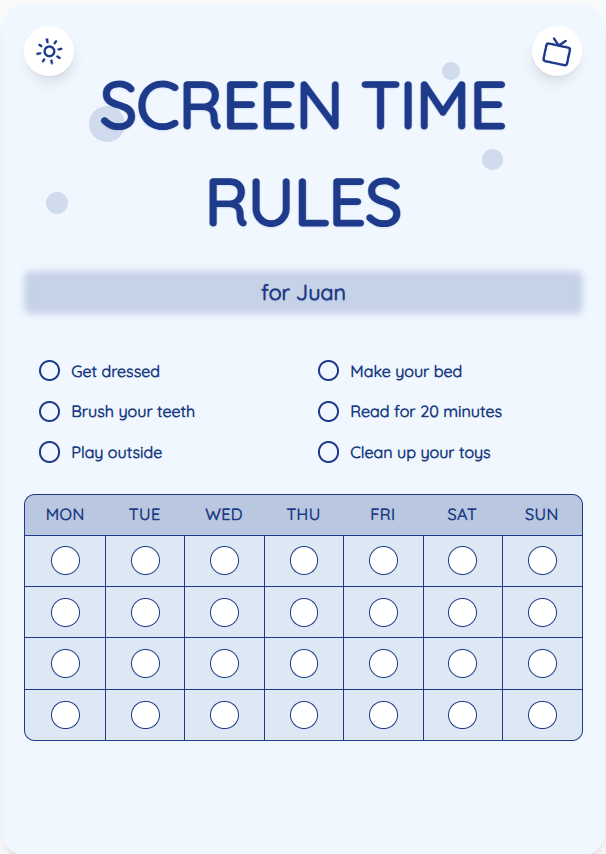Effective Strategies for Parents Handling 9 Hours of Screen Time for Kids
As a parent, dealing with your child's 9 hours of screen time can be overwhelming. Finding the right balance between screen time and other activities is crucial for your child's development. In this guide, we provide actionable advice and tips to help you manage screen time effectively while promoting healthy child development and family harmony.
See What Your Screen Time Chart Will Look Like
Here's an example of a beautiful, customizable screen time rules chart you can create for your family

Understanding the Impact of Excessive Screen Time
Excessive screen time can have negative effects on children's physical health, mental well-being, and social skills. It can lead to obesity, sleep disturbances, behavioral issues, and poor academic performance. As a parent, it's essential to be aware of these risks and take proactive steps to limit screen time.
Setting Screen Time Limits and Boundaries
Create a screen time schedule that balances recreational screen time with educational and active playtime. Use screen time charts from ScreenTimeRules.com to set clear boundaries and limits. Encourage alternative activities like reading, outdoor play, and family bonding to reduce screen time.
Put These Tips Into Action
Create a custom chart to implement these strategies with your child
Engaging Kids in Screen-Free Activities
Provide a variety of screen-free activities that spark creativity and imagination. Organize arts and crafts projects, board game nights, nature walks, or cooking sessions to keep your child engaged and entertained without screens. Limiting screen time can enhance your child's cognitive skills and emotional development.
Practical Tips for Success
- Create a daily screen time schedule using a screen time chart
- Encourage outdoor activities to reduce screen time
- Set a good example by limiting your own screen time
- Use screen time as a reward for completing tasks
Frequently Asked Questions
How does excessive screen time impact children's sleep?
Excessive screen time before bedtime can disrupt children's sleep patterns due to the blue light emitted by screens, which suppresses melatonin production. Limiting screen time before bedtime can improve sleep quality.
What are the signs of screen addiction in children?
Signs of screen addiction in children include irritability when screens are taken away, neglecting other activities, withdrawal from social interactions, and a decline in academic performance. It's important to address these signs early on.
How can parents encourage healthy screen habits?
Parents can encourage healthy screen habits by modeling good behavior, setting clear rules and expectations around screen time, engaging in joint media activities with their children, and promoting a balance between screen time and other activities.
Managing your child's 9 hours of screen time requires proactive measures and consistent efforts. By implementing the tips and strategies outlined in this guide, you can create a healthy balance between screen time and other activities, promoting positive child development and family bonding. Visit ScreenTimeRules.com to generate personalized screen time charts tailored to your family's needs.
Ready to Transform Your Family's Screen Time?
Join thousands of parents who have successfully managed screen time with our customizable charts.
